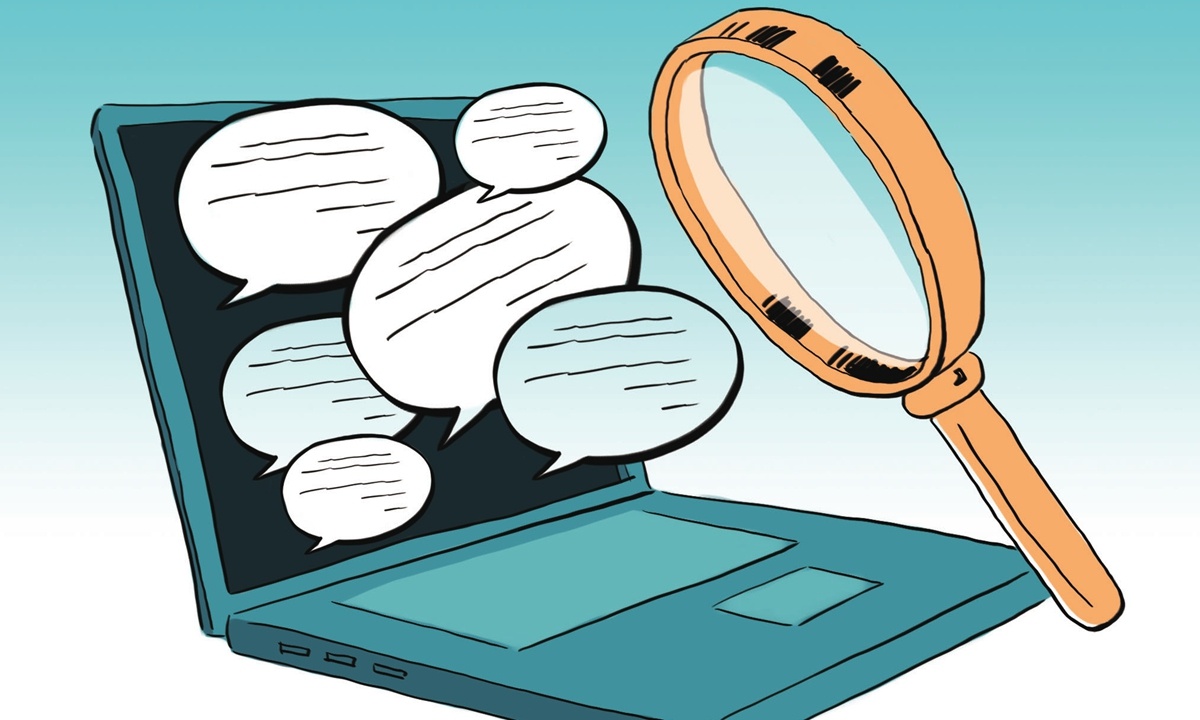The other day I was impressed by an interview in the documentary The Post-Pandemic Era by Japanese director Ryo Takeuchi. When Qi Yue, the director of Lenovo's Wuhan base, talked about COVID-19 prevention and control in the factory, he posed an interesting question, "Has the internet shortened the distance between people, and are people more willing to understand each other?"

Illustration: Liu Rui/GT
As the pandemic has swept the whole world, the prevention and control measures have greatly reduced face-to-face communication. During this period, considering the physical distance, the internet has therefore played an essential role in communication. It is necessary to think about the role of the internet in interpersonal relationships.
On the one hand, the internet serves as a low-cost but efficient platform for maintaining and developing connections. On the other hand, it is a space full of fragmented information, so the bits and pieces of information accessible to a person make it difficult to grasp an overall picture of the person or event involved.
As the pandemic has made social distancing a necessity, the internet is connecting people closely through instant communications but also weakening mutual understanding due to an overwhelming amount of information and half-truths.
According to the 46th China Statistical Report on Internet Development issued by China Internet Network Information Center in September last year, there are 940 million netizens in China by June of 2020, one-fifth of the world's total netizens. During the pandemic, great changes have taken place in the internet-based socializing. New forms of social activities have emerged one after another, such as "cloud party."
Besides, true words, photos and videos on the internet show how people from all walks of life fight against COVID-19. The internet offers people opportunities to express their feelings and develop strong empathy which brings people closer during hard times.
But it is increasingly evident that positive feedbacks about the internet today are overshadowed by its negative impacts. First, the right to free speech is abused in cyberspace. With an anonymous identity, users regard the internet as their playground so that they commit verbal violence against innocent people without scruple. During the pandemic, when the precise movements of some confirmed cases are exposed, various conjectures and malicious gossips about the cases keep cropping up online. Then netizens are ready to judge and criticize them as a guardian of morality and this is how cyber bullying happens.
Second, internet-based social media have gradually aggravated social anxiety because of a sense of loss arising from comparing oneself to others. Varied functions of social media like comments and retweeting enable people to enjoy being the center of attention in cyberspace. However, users also suffer from these functions. Compared with their popular friends, they may feel anxious and even humiliated when getting no likes or comments after sharing their delicate words, photos or videos online. As a result, they may draw a conclusion that nobody understands or cares about them, and the sense of loss prompts users to become inaccessible to others online.
Third, users lose patience in distinguishing between true and false information on the internet. Resource sharing and user-oriented services characterized by the internet expose each netizen to a mass of information, but incomplete pieces of information and tailored messages usually lead to blind obedience, misunderstanding and even complacency. A lot of false information was distributed surrounding COVID-19. Distrust is likely to generate insecurity.
Last, truth seems to have become less attractive than emotions on the internet. Netizens prefer giving full vent to their feelings about a person or an event rather than considering and analyzing evidence or details first. Without any serious scientific evidence, rumors about the origin of the coronavirus fly on the internet, so negative emotions stirred by the rumors in the cyberspace are running high. Therefore, a growing rift among countries does damage to mutual understanding and increases distance between nations.
How the internet affects relations among people during the pandemic is related to usage of the internet. Although it helps maintain interpersonal relationships through instant communication, the internet also created barriers to mutual understanding because of its negative impacts. In order to make full use of the internet to enhance mutual understanding, only truth needs to be told, although this is not easy to ensure.
The author is a postgraduate of Shandong University.


